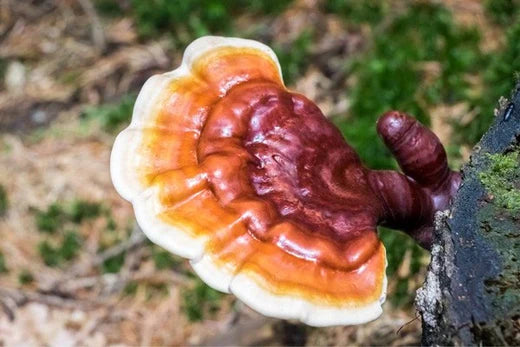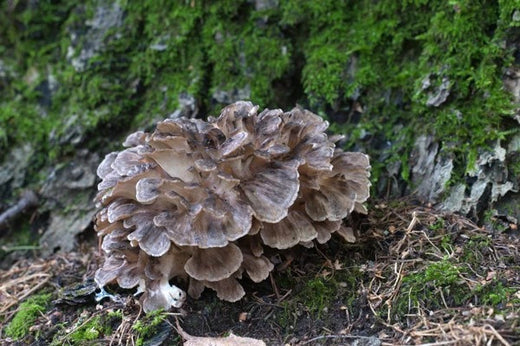Is it Safe for Dogs to Consume Mushrooms?

A Brief Overview
Dogs are known as loyal companions to humans. As responsible pet owners, we always prioritise the well-being of our furry friends and strive to ensure their good health. We wish for their presence in our lives to be everlasting.
While we are aware of the significant health advantages that medicinal and culinary mushrooms offer to humans, it is worth considering whether dogs can also benefit from mushrooms. Can dogs eat mushrooms to improve their health?
This article intends to explore the relationship between mushrooms and dogs. Can dogs safely consume mushrooms? We will identify the mushroom species that are safe for dogs to consume and those that can be toxic to them.
It is crucial to acknowledge the genuine risk of mushroom poisoning in dogs. By reading this article, you will gain knowledge about the mushrooms that should be avoided in order to keep your beloved pet safe.
We will delve into the various health benefits that medicinal mushrooms offer and highlight the types that are safe for your dog to consume. These mushrooms can support your dog's immune system, promote liver function, increase antioxidant levels, and much more.
Table of Contents
-
Is it Safe for Dogs to Consume Mushrooms?
-
Toxic Mushrooms for Dogs
-
Types of Poisonous Mushrooms
-
Safe Mushrooms for Dogs to Eat
-
Edible Types of Mushrooms
-
Health Benefits of Edible Mushrooms
-
Adding Edible Mushrooms to your Dog’s Diet
-
Frequently Asked Questions
-
Which mushrooms are toxic to dogs?
-
What happens when dogs eat mushrooms?
-
What types of mushrooms can dogs eat?
-
Which three mushrooms are good for dogs?
-
In Conclusion
-
References
Is it Safe for Dogs to Consume Mushrooms?
The world of fungi, compared to the plant kingdom, remains largely unexplored. Every year, numerous new mushroom species are discovered in the field of mycology.
Around 1% of mushroom species are known to be poisonous and harmful to humans, as well as toxic to dogs. This applies similarly to the plant kingdom.
Are mushrooms safe for dogs to eat?
There are many mushrooms that are not only safe but also highly beneficial for both humans and dogs to consume. These mushrooms promote good health by providing a wide range of benefits, such as boosting antioxidants, reducing stress and anxiety, containing anti-tumor properties, strengthening the immune system, lowering cholesterol, and more.

Toxic Mushrooms for Dogs
As mentioned earlier, like humans, there are mushrooms that dogs should avoid as they can be poisonous and potentially lethal if ingested.
The crucial distinction lies in whether the mushrooms your dog consumed were found in the wild, which tends to be riskier as there is no control over the species or quantity ingested. On the other hand, intentionally adding mushrooms to your pet's food, specifically medicinal mushrooms known for their health benefits, can be highly advantageous for your dog.
The level of mushroom toxicity and its effects on your dog will depend on the particular species or species they have consumed.
If your dog eats wild mushrooms and exhibits unusual behaviour or symptoms, it is essential to seek immediate veterinary care for supportive treatment.
Types of Poisonous Mushrooms
In general, unless you are a trained mycologist with field experience, it is challenging for most dog owners to identify safe or poisonous wild mushrooms that may be toxic to dogs.
To ensure extra safety and prevent mushroom poisoning, it is best to keep your dog away from all wild mushrooms while out on nature walks.
The following is a list of poisonous mushrooms that are toxic to dogs:
- Amanita phalloides (Death Cap mushroom)
This mushroom, as the name suggests, is poisonous to both humans and dogs. It is white or light green in colour and one of the most dangerous species. Amanita phalloides contain amanitin toxins that cause severe gastrointestinal symptoms, often appearing six hours or more after ingestion. The symptoms may briefly subside before significant liver damage or failure occurs.
- Amanita ocreata (Angel of death)
Angel of death mushrooms contain amanitin toxins and have a light white appearance with dark spots. Consuming these mushrooms can lead to liver and kidney damage, with gastrointestinal disturbances serving as initial signs of poisoning. Ingestion of this mushroom can be fatal.
- Lepiota
The Lepiota genus consists of gilled mushrooms that are neurotoxic due to the presence of amatoxins. They are typically found in woodlands.
- Galerina
Galerina is a genus of small brown-spore saprobic mushrooms, with over 300 species found worldwide. One common species, Galerina marginata, resembles the death cap in appearance and is equally dangerous and deadly. It usually grows on decaying wood.
- Panaleous
Panaeolus species are small, dark-spotted, gilled mushrooms that are primarily brown in colour. They are often found in grasslands and woodlands and can disrupt neural networks, leading to symptoms such as urination and diarrhoea.
- Amanita pantherina (Panther cap)
If ingested by dogs, the Panther cap mushroom causes symptoms such as salivation, urination, diarrhoea, neurological dysfunction, and potential coma-like sleep. It has a dark brown appearance with white spots and emits a fishy odour.
- Amanita muscaria (Fly agaric mushroom)
The fly agaric, also known as Amanita muscaria, is one of the most common Amanita mushrooms. It is characterised by its red cap with white spots. While this species is not commonly found in urban or city areas, ingesting it can cause neurological symptoms, tremors, difficulty walking, and seizures in dogs. Another Amanita species, Amanita gemmata, should also be avoided by dogs.
- Gyromita esculenta
Gyromita esculenta is not fatal, but consumption can lead to vomiting, diarrhoea, and seizures. This dark brown, brain-like mushroom is usually found in woodlands and forests.
- Gyromita caroliniana
Gyromita caroliniana has a wrinkled red-brown cap and can grow quite large. It is found in hardwood forests and contains gyromitrin, a known toxic compound (similar to gyromitra esculenta and other Gyromitra spp).
- Entolomo
Entoloma mushrooms resemble large pink-gilled mushrooms and contain the toxin muscarine. Ingesting these mushrooms can cause gastrointestinal irritation, and although not fatal, symptoms can persist for 1-2 days.
- Boletus
Boletus mushrooms can cause gastrointestinal irritation similar to Entolomo mushrooms, but they are not fatal. They have a brown cap and are commonly found in forests and plantations.
- Chlorophyllum
Chlorophyllum is a genus of large agarics that resemble parasol mushrooms. It is the most commonly ingested poisonous mushroom in North America. Consumption of Chlorophyllum mushrooms can lead to gastrointestinal toxicity in dogs. This species is widespread and can be found near urban and city areas. It has a white-brownish cap with large brown scales.
Remember, it is crucial to exercise caution when it comes to dogs and mushrooms. If you suspect your dog has consumed any toxic mushroom or is showing abnormal symptoms, it is best to seek immediate veterinary attention."

Safe Mushrooms for Dogs to Eat
"Dogs can safely consume certain mushrooms, as discussed previously. In fact, there are more mushrooms that are safe for dogs to eat than there are toxic ones or species that can cause mushroom poisoning in dogs.
Similar to humans, culinary mushrooms have been proven to be safe for dogs. Some commonly found mushrooms, such as porcini, cremini, portobello, and white button mushrooms, can be purchased from local grocery stores.
To fully benefit from culinary mushrooms, it is recommended to cook them before feeding them to your dog. However, there is no danger if your dog consumes mushrooms in their raw state.
If you want to enhance your dog's overall health, medicinal mushrooms provide a wide range of benefits. There are several medicinal mushrooms available in the market, but the most commonly used for dogs are Reishi mushroom, Maitake mushroom, and Shiitake mushroom.
You can allow your dog to eat mushrooms from the following varieties:
Edible Types of Mushrooms
-
Reishi Mushroom
Reishi Mushroom is extensively studied and known as the "Queen of Mushrooms." It has profound health benefits, including calming the central nervous system, reducing stress and anxiety, boosting the immune system, supporting a healthy cardiovascular system, and possessing anti-tumor and anti-cancer properties.
Consider incorporating Teelixir organic Reishi Mushroom products into your dog's diet.
-
Maitake Mushroom
Scientific research suggests that Maitake extract is one of the most effective immune-supportive mushrooms. Maitake mushrooms are rich in beta-glucan polysaccharides, also known as "biological response modifiers," for their powerful ability to activate the immune system.
Maitake mushroom has shown to improve cholesterol and blood lipids, support cardiovascular function, and provide anti-diabetic and anti-hypercholesterolemia benefits.
Consider adding Teelixir organic Maitake Mushroom extract to your dog's diet.
-
Shiitake Mushroom
Shiitake mushroom is a potent immune-boosting mushroom that may have anti-cancer and anti-tumor benefits. It also possesses antiviral and antibacterial properties, making it excellent for modulating and supporting the immune system. Dried Shiitake mushroom is also a dietary source of vitamin D.
You can find Shiitake mushroom extract in the Teelixir Mushroom Immunity blend.
-
Porcini Mushroom
Porcini mushrooms are edible culinary mushrooms with a dark brown colour and a nutty, earthy flavour. They are commonly found in Italian cuisine and are also available dried. Dried mushrooms provide a good amount of vitamin D due to sun exposure and offer antioxidants, protein, fibre, and potassium.
-
Cremini Mushroom
Cremini mushrooms, also known as common brown mushrooms, can be found in supermarkets and fresh produce stores. They are a dietary source of choline, betaine, calcium, phosphorus, potassium, and selenium.
-
White Button Mushroom
White button mushrooms are commonly found in the produce section of stores. They are the youngest and smallest among mushrooms, harvested early. White button mushrooms are rich in vitamin D, selenium, and phosphorus.
-
Portobello Mushroom
Portobello mushrooms are larger mushrooms and are the mature version of white button mushrooms. They contain the antioxidant compound ergothioneine and are also a source of vitamin B2, copper, and selenium.
Overall, culinary mushrooms are safe for dogs and provide dietary choline, selenium, B vitamins, phosphorus, and insoluble fibre from Chitin, which can help modulate the microbiome and lower cholesterol.
Health Benefits of Edible Mushrooms
-
Antibacterial, Anti-Fungal, Anti-Parasitic, Anti-Viral
Mushrooms offer immune-protective benefits such as antibacterial, anti-fungal, anti-parasitic, and anti-viral properties.
The anti-parasitic aspect of mushrooms is particularly beneficial for dogs, as they are exposed to numerous pathogens that humans are not. Consuming mushrooms may help support a healthy microbiome and protect against invading parasites.
-
Antidiabetic and Anti Hypercholesterolemia
Dogs, like humans, can experience diabetes and increased lipid levels in their blood, which can lead to heart disease and cardiovascular issues. Mushrooms have been shown to improve blood sugar and lipid balance, supporting these systems in dogs as well.
-
Antioxidant
Mushrooms contain antioxidants that help balance inflammation and oxidative stress. Since inflammation is a key factor in the development of various diseases, including arthritis, cancer, and aging, consuming antioxidant-rich mushrooms can contribute to your dog's overall well-being.
-
Antitumor
Research suggests that medicinal mushrooms have potential antitumor and anti-cancer properties, making them valuable in scientific studies. Medicinal mushrooms may serve as a beneficial superfood for dogs to help regulate tumour growth. It is advisable to consult with a veterinarian before incorporating them into your dog's diet.
-
Cardiovascular Benefits
Mushrooms improve the function and structure of a dog's cardiovascular system, including the heart, blood vessels, arteries, veins, and circulation. This is particularly beneficial for active dogs that engage in constant running and play. Mushrooms can enhance their endurance, fitness levels, and protect against cardiovascular diseases.
-
Detoxification and Hepatoprotective
Mushrooms are known to support detoxification pathways and possess hepatoprotective properties, benefiting the liver. Additionally, mushrooms contribute to a healthy gut microbiome. Both the liver and gut play essential roles in detoxification. Dogs are exposed to environmental pollutants, heavy metals, pesticides, fungicides, chemicals, parasites, and pathogens similar to humans. It is crucial for harmful compounds to be effectively detoxified and eliminated from their bodies.
-
Immunomodulating
Mushrooms have immunomodulating properties that help support and balance the immune system. This benefits dogs by protecting them against parasites, nourishing skin health, aiding detoxification, soothing allergies, and potentially inhibiting tumour growth.

Integrating Edible Mushrooms into Your Dog's Diet
To ensure the best care for your dog, it is advisable to seek advice from your veterinarian before introducing any new medicinal mushroom or supplement into their diet.
To maximise benefits and convenience, it is recommended to incorporate a concentrated extract powder of medicinal mushrooms into your dog's daily food.
When it comes to dosage, the suggested amount is 1-2.5 grams per day or 20-50 milligrams per 1 kilogram of body weight, depending on your dog's breed and size.

Including the recommended dosage of mushroom extract powders in your dog's diet is a simple and effective way to promote their health and well-being.
Frequently Asked Questions

Which mushrooms are toxic to dogs?
There are more than sixty mushroom species known to be poisonous to dogs, causing mushroom toxicity. Symptoms of mushroom poisoning in dogs may include vomiting, diarrhoea, lethargy, dehydration, laboured breathing, loss of appetite, and can manifest within 2-24 hours after ingestion. More severe effects can include abdominal pain, liver damage, and kidney failure.
If your dog consumes mushrooms from the wild and exhibits unusual behaviour or shows signs of mushroom poisoning, it is strongly advised to promptly take them to a veterinarian.
What happens when dogs eat mushrooms?
If your dog ingests wild mushrooms, symptoms of mushroom poisoning may include vomiting, diarrhoea, lethargy, dehydration, laboured breathing, and loss of appetite. These symptoms can appear within 2-24 hours after consumption.
However, if your dog consumes safe culinary or medicinal mushrooms, they pose no harm and will not lead to any adverse effects.
What types of mushrooms can dogs eat?
There are numerous safe and healthy mushrooms that dogs can eat, including culinary varieties like white button, shiitake, portobello, and more. Medicinal mushrooms such as Reishi, Maitake, Cordyceps, and Turkey Tail are also highly beneficial for a dog's well-being due to their remarkable health-promoting properties.
Which three mushrooms are good for dogs?
Reishi Mushroom, Maitake Mushroom, and Shiitake Mushroom are three examples of mushrooms that are beneficial for dogs to consume.
In Conclusion
Can dogs eat mushrooms? We trust that this article has provided insights into the compatibility between mushrooms and dogs, highlighting which types are suitable for canine consumption and which ones to avoid.
It is crucial to exercise caution and prevent your dog from consuming wild mushrooms found on lawns or during walks in parks and forests.
Mushroom poisoning in dogs is a genuine concern, and we want to ensure the safety of your furry companion.
Take the time to learn more about safe and healthy mushroom varieties, including culinary and medicinal mushrooms. These types are safe for dogs and offer numerous health benefits.
Remember, it is always wise to consult with your veterinarian before introducing any new medicinal mushroom or supplement into your dog's diet."
References
-
Mushroom Poisoning in Dogs - https://www.walkervillevet.com.au/blog/dog-mushroom-poisoning/
- Wild mushrooms: which ones are dangerous for dogs? - https://tails.com/blog/2019/10/10/wild-mushrooms-which-ones-are-dangerous-for-dogs/
- Dogs Mushrooms: Are They Poisonous? - https://www.pethealthnetwork.com/dog-health/dog-toxins-poisons/dogs-and-mushrooms
Written by Eliza Hedley
Eliza Hedley is a health, mindset and abundance enthusiast obsessed with helping millennial's experience living at a higher level.
Eliza's relaxed new age approach and understanding of nutrition and wellness sees her empowering and coaching individuals to understand that their health is the ultimate asset. Upon experiencing first hand the power and place of tonic herbalism and medicinal mushrooms in everyday life, Eliza’s become an adaptogen fangirl and feels their utilisation in today’s world is essential for abundance and wellbeing.






